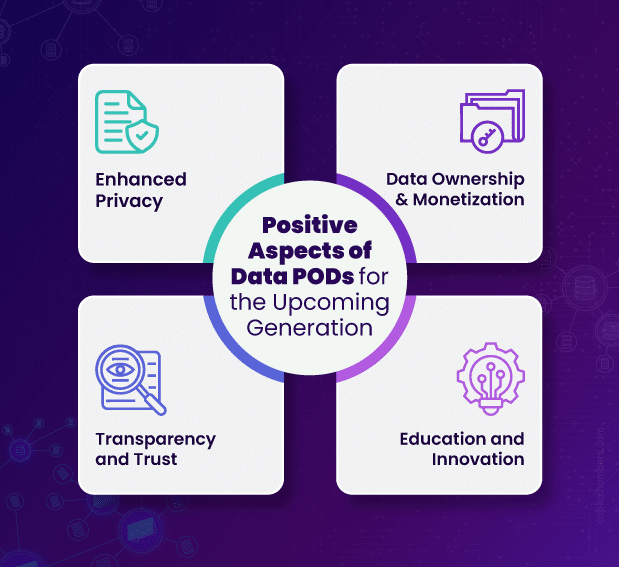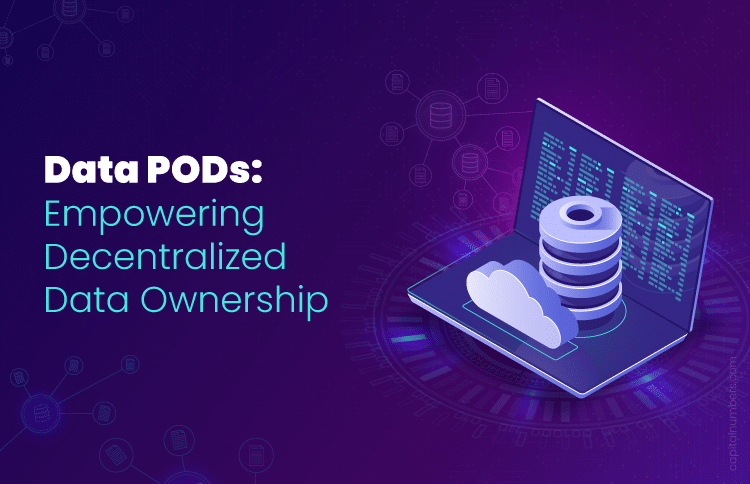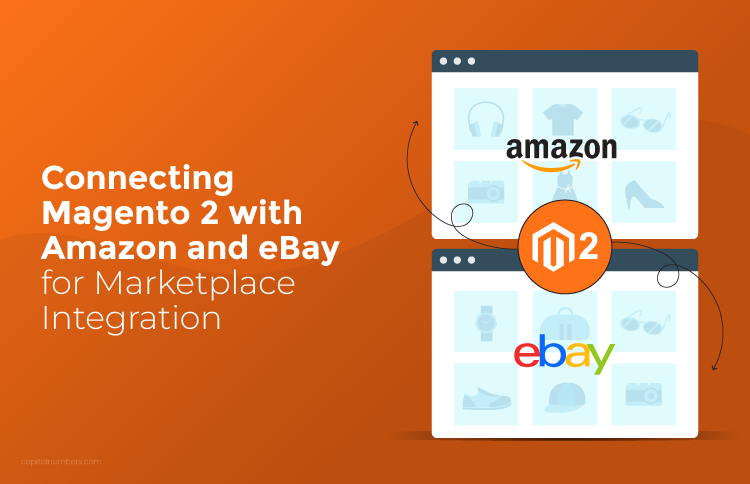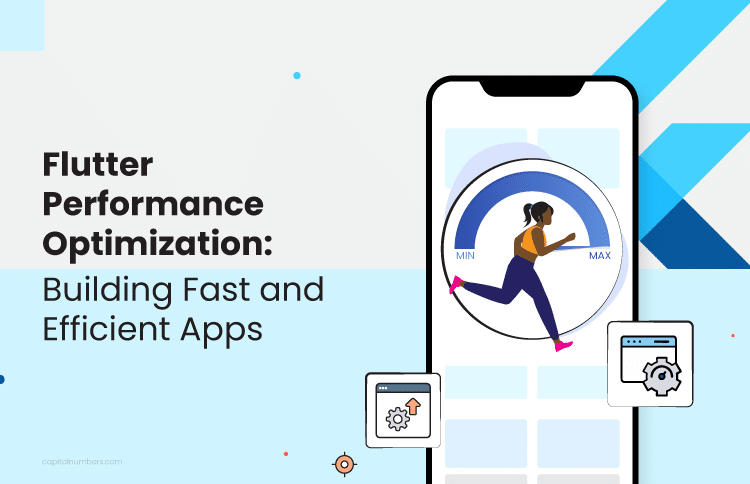Data PODs: Powering the Future with Decentralized Data Ownership
Table of Contents
Imagine living in a world where all your personal data is under your control. You decide what can be accessed and by whom. It’s a world with no products and no e-businesses intruding on your personal life. Companies can no longer spy on us using their data centers. Picture a decentralized world where you are free to achieve your goals without government-imposed regulations. In simple terms, you are at the center of your private data environment.
What are Data PODs?
Think of them as your own private data vaults. When you entrust them with your data, such as browsing history, banking, and medical records, they process the data with secure encryption. Only you and the people you choose will have access to it. You decide which data is included, who can see it, and for how long. For example, you can store some information for the welfare of your child.
Why are Data PODs important?
Today, the data environment is dominated by big technology companies that gather, manipulate, and sell our information, often without our consent. This exploitation raises significant security and privacy concerns. Data PODs offer a solution by allowing individuals to reclaim control over their digital lives and live independently.
Positive Aspects of Data PODs for the Upcoming Generation

- Enhanced Privacy: Imagine a future where teens don’t have to worry about their browsing history or embarrassing images affecting their job prospects or school status. Data PODs allow individuals to exercise more control over their digital footprint, fostering a society where people can behave ethically and responsibly without fear of past actions coming back to haunt them.
- Data Ownership and Monetization: Data PODs are central to data ownership and monetization, giving users the power to control their digital experiences. Users can choose which institutions, such as researchers or healthcare providers, to share their data with and for what purposes. They might even receive compensation for their data, creating a more equitable economy by allowing individuals to profit from their personal information.
- Transparency and Trust: Data PODs enhance transparency and trust by empowering end-users. Users can decide which institutions to share their data with and for what reasons, potentially receiving payment in return. This creates a more balanced data economy, where individuals benefit from the value of their data rather than merely serving as data providers.
- Education and Innovation: A UN report from 2018 highlighted the positive consequences of citizen engagement through digital tools for blockchain implementation. With Data PODs, citizens can actively participate in online systems, fully controlling their data at any time and from anywhere. The platform also tracks and stores information on cookies, beacons, and other security-compromising elements, preventing involuntary sharing of personal data with marketers.
Real-World Applications of Data PODs
- Healthcare: Instead of relying on traditional systems, you can save your entire medical history on your Data POD. Imagine how convenient it would be to allow your doctor to view the necessary records each time you visit. This ensures you receive the right diagnosis and treatment based on your specific medical history. Better data organization will lead to fewer errors, more effective treatments, and reduced medical errors.
- Finance: In banking, Data PODs fundamentally modify how data is handled, shared, and disseminated. Instead of sharing data with multiple entities, clients can permit access to their data only when required, by sharing simple encrypted data. This minimizes the risk of data breaches and ensures that only the necessary information is shared for purposes such as loan applications, credit evaluations, or financial counseling.
- Education: Through Data PODs, students can store their learning progress, certifications, and academic records securely. Teachers can adapt learning programs to individual needs, making education more effective. Additionally, students can easily exchange their academic records with different schools, fostering the idea of lifelong learning.
Challenges and Considerations
The concept of Data PODs is highly promising, but it also presents several practical difficulties. Significant challenges that need to be addressed include interoperability, security requirements, and user education. Additionally, to ensure fair participation in this new data world, the technology must be made accessible to everyone, regardless of income. The gap between those who have access to the technology and those who do not must be minimized.
The Possibility of Data PODs
Technological Data PODs are still in their early stages, but they already look promising. A better, more ethical, and user-centered digital future can be realized when individuals are given responsibility and power over their data. The future generation, as the main driver of this change, will play a crucial role in creating a society where data serves as a means of empowerment rather than exploitation.
Technical Aspects and Security of Data PODs
- Security and Encryption: Data PODs elevate the privacy and security of your data by using advanced encryption technologies. The risk of unauthorized access or data breaches is minimized through end-to-end encryption, ensuring that only authorized parties can access your data.
- Interoperability: Data PODs should not be limited to specific platforms and systems. They can only work effectively through the use of different platforms. Interoperability enables the seamless exchange and use of your data across various services. This is achievable through standard methods and close cooperation among tech developers.
- User-Friendly Design: Data PODs are designed to be accessible to everyone, not just technical and computing experts, which presents a challenge in creating a user-friendly interface. User acceptance, intuitive systems, and user training are crucial. This involves designing systems that are easy for users to navigate. Additionally, detailed instructions or assistance will be provided to help consumers manage their data efficiently.
Ethical and Legal Considerations for Data PODs
- Regulatory Frameworks: Governments and regulatory agencies are expected to create laws and regulations to monitor the usage of Data PODs as they become more popular. Key actions include defining user rights, ensuring data privacy, and setting guidelines for data sharing and monetization.
- Ethical Data Use: The effectiveness of Data PODs will benefit from the practice of ethical data usage. This includes guarding against data misuse, ensuring transparency in data usage, and allowing consumers to make informed decisions. Planned ethical norms will enforce responsibility and reliability in the use of Data PODs.
- Digital Inclusivity: To address social inequality, it is crucial to close the digital gap and ensure that Data PODs are universally accessible. This requires providing affordable technology, internet access, and education on how to use these tools effectively.
Future Prospects and Innovations for Data PODs
- AI and Data PODs: Combining AI with data POD scan enhance automation and personalization. AI can process the data within your POD without violating your privacy, developing personalized suggestions, automating processes, and providing insights into your preferences and habits.
- Blockchain Technology: To achieve this, blockchain technology can offer a secure data protection system that logs every data transaction. Blockchain ensures that Data PODs are strong, secure, and easily accessible, trending in the right direction for data protection and transparency.
- International Collaboration: Data PODs facilitate essential international cooperation. The exchange of best practices, the formation of international standards, and cross-border collaborations will accelerate the adoption and innovation of Data PODs.
Stay Tuned
The Data POD revolution has only just begun. We can expect many exciting opportunities in the future, driven by user adoption, technological advancements, and innovative data engineering services. This will shape a future where people have both the power and the regulation to navigate the digital world with confidence.

















